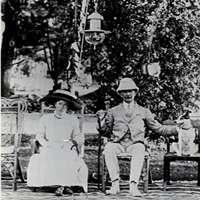South Asian oral history archive goes online

(PhysOrg.com) -- A unique collection of hundreds of interviews with people who witnessed Indian independence and the final days of the British Raj is being put online.
The oral history archive, held at Cambridge University, features more than 300 recordings, including first-hand accounts of meetings with Mahatma Gandhi and testimonies by freedom fighters whose terrorist acts aimed to force an end to British rule.
Alongside the campaigners, freedom-fighters and assassins, ordinary people such as doctors, missionaries, farmers and police officers give intimate reminiscences of Empire, Indian independence, and of partition.
The collection is owned by the University's Centre of South Asian Studies and contains more than 500 hours of audio material and 10,000 pages of interview transcripts. The entire collection is being made available in full, for free, as streamed audio at www.s-asian.cam.ac.uk . Themed collections of excerpts are also available for download from the University's iTunesU channel and at www.admin.cam.ac.uk/news/special/20091205/
The recordings were made in the 1960s and 70s as part of a wider project to preserve the memories of the British in India, members of the Indian independence movement, and people who had known Gandhi. The original cassettes and reel-to-reel tape had become unusable because of fears that playing them regularly would cause irrevocable damage.
For the past three years, Mr Ivan Coleby has been painstakingly transferring the interviews from the original tapes to create a new collection of digital files.
"From the time they were first captured, the use of this invaluable resource has had to be severely restricted to prevent the tapes from deteriorating through wear," Dr Kevin Greenbank, archivist at the University of Cambridge Centre of South Asian Studies, said. "Technology came to the rescue before too much damage was done and it will now be possible to hear the recordings anywhere in the world online."
The collection includes first-hand accounts of Gandhi's civil disobedience and non-cooperation campaigns from people who knew and helped him.
Some reveal how fragile those efforts often seemed. Interviewed in 1969, for example, the former freelance journalist, Shri S. R. Tikekar, who took part in the famous 1930 Dandi salt march and was later in prison with Gandhi in Poona, remembers how "desperate" the iconic father of Indian independence appeared when his campaigns failed to provoke a reaction.
When the authorities initially ignored the march Tikekar says Gandhi became "uneasy". "He never thought he would be allowed to walk these 240 miles; he expected arrest on the day he started," he adds. "Every time when he thought he was being ignored, his speech became more and more desperate."
Others, however, describe how Gandhi gave the movement irresistible momentum. Newspaper correspondent Bhalchandra Dhurandur recalls: "When Gandhiji walked from place to place, the whole of India was marching with him… when the news was flashed across the whole of India that his march had galvanised all the villagers on the way, it was almost like an explosive movement."
Some interviews provide a first-hand view of the more militant and violent acts that took place in the name of independence. Speaking in 1971, B V Chavan describes how he bombed the popular Capitol Cinema in Poona in 1943 for the "Quit India" campaign, killing three British soldiers and wounding 13.
In another recording, freedom fighter B V Gogate discusses his bungled attempt to assassinate the acting Governor of Bombay, Sir Ernest Hotson, in July 1931, in revenge for the execution of freedom fighters in Sholapur. Remarkably, the collection also features an interview with Sir Ernest himself, reflecting on the attempt on his life.
The assassination attempt was a spectacular failure. Gogate shot Hotson twice at point-blank range, but was set upon by the Governor himself, who overwhelmed him. At the subsequent trial, the prosecution claimed that Hotson had been saved by a nickel button. Gogate, as the interview records, believed that his target was really wearing a steel jacket for fear of reprisals. The would-be assassin spent five years in prison.
Elsewhere, eyewitnesses describe their experiences of the bloody ethnic violence and partition that accompanied independence and give candid accounts of the of the last days British rule itself.
Women who found themselves in India because their husband was a diplomat or soldier describe how they adapted to life in remote rural areas or Himalayan jungle. Missionaries recount the hands-off approach of the British administration in areas such as Hyderabad, which could have devastating consequences in times of famine. And Indians who fought for the British in World War II even as their own countrymen were trying to end British rule discuss life on the front line.
The digitisation of the collection has taken three years. Master digital copies are now being stored on DSpace, the digital archive repository within the University Library, and at the Centre. The original tapes will be packed and stored in refrigerated conditions.
More information: Further information about the oral history archive and other archival materials at the Centre of South Asian Studies, University of Cambridge, can be found at: www.s-asian.cam.ac.uk/
Provided by University of Cambridge (news : web)
















